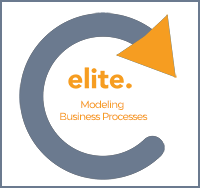BCS Certificate in Modeling Business Processes
Code: MBP-2
Duration: 2 Days
Delivery methods: Classroom, Virtual Learning, Onsite Event
What is included: Pre-coursework and exam
Price per delegate: $1,395.00


In order to deliver radical and beneficial change, business analysts must be able to identify, evaluate and improve business processes. The use of modeling techniques facilitates a methodical and effective approach to defining change requirements. This allows public and commercial sector organizations to achieve significant improvements in the efficiency of their operations and the effectiveness of their product and service delivery.
This course will help business analysts deal with these challenges. It will equip delegates with the process modeling skills that are fundamental to the successful improvement of the business.
At the end of the course, delegates may sit an examination to attain the ISEB Business Systems Development Certificate in Modelling Business Processes. (These delegates should also book on course code MBPEX-2). This course may be taken as part of the Elite program leading to the ISEB Diploma in Business Analysis.
There are no specific pre-requisites for this course.
Those wishing to attain the ISEB Certificate in Modelling Business Processes. (These delegates should also book on course code MBPEX-2). Candidates with special examination requirements should consult the ISEB website (www.iseb.org.uk) for the ISEB Special Needs policy. Note that the ISEB must be advised at least four weeks in advance of any special requirement.
Delegates will learn how to:
The context for business process modelling
Relationship between business systems and automated systems; Purpose of modeling business processes; Approaches to business process modeling
Identifying business processes
Definition of a business process; Differences between the process view and the functional view of an organization; Advantages of the process view; Importance of metrics; Value chain analysis; Relationships between processes; Building an organizational view of processes.
Modelling business processes
Overview of different modeling techniques (swim lane diagrams, activity diagrams); Modelling notation and rules; Events that trigger business processes; The outcomes from business processes; The stakeholders involved with business processes
Evaluating and improving business processes
Modeling as-is business processes; Identifying problems with the as-is process; Problem analysis; Benchmarking; Identifying inappropriate workflows; Identifying inappropriate IT support; Staffing issues; Challenging the business rules; Modelling the to-be business processes; Implementing the new approach
Transition from business modelling to system requirement specification
The extent of IT support for the business processes; Scoping the IT development effort; Documenting IT system requirements; Integration of process modeling, requirements definition, and systems development; Related issues: Organisational design, Procedure design, Skills profiling and training, managing change.
Case Study
Throughout the course, a case study is used to reinforce and practise the topics discussed
MBPEX-2
ISEB Certificate in Modelling Business Processes